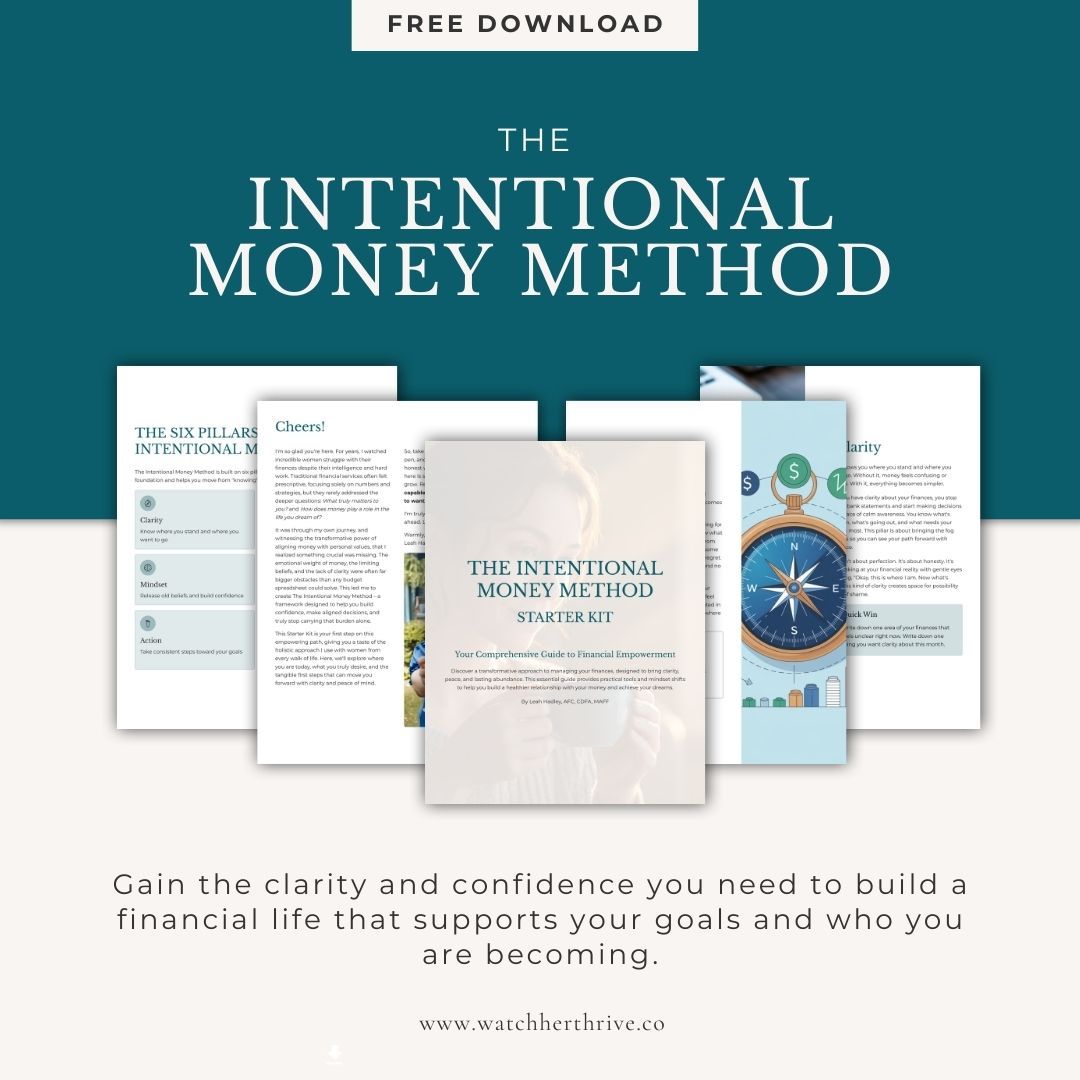Busting 3 Myths about Women & Money

Have you ever been told that you're not good with money? That women aren't as financially savvy as men? That we're more prone to overspending and living beyond our means? Unfortunately, these kinds of stories are all too common. But the truth is, they're just myths.
I’m going to bust some of the most pervasive myths about women and money, and share some truths that will help you take control of your finances.
Myth #1: Women are naturally bad with money.
There's no biological or genetic reason why women would be less skilled at managing finances than men. Studies have shown that women tend to be more diligent about budgeting and saving than men, and are less likely to take on risky investments.
A report published in 2018 by the Warwick Business School in the UK analyzed data from 2,800 investors over a three-year period and found that women generated higher returns on their investments than men. The report attributed this trend to the fact that women tend to be more patient and less li...
5 Smart Ways to Become a Better Investor

Are you wondering how to become a better investor?
It’s an admirable goal but it can feel intimidating at first. Between market fluctuations, endless headlines, and so much financial jargon, it’s easy to get overwhelmed.
The good news is that successful investing doesn’t require perfect timing or insider knowledge. It requires clarity, patience, and consistency.
Here are five timeless investing tips that can help you grow your confidence and become a smarter, more intentional investor no matter where you’re starting from.
1. Have a Clear Investment Strategy
The foundation of good investing is having a clear strategy that reflects your goals and your stage of life.
Before diving into individual investments, ask yourself:
• What are my short- and long-term financial goals?
• What time frame am I working with?
• How much risk am I comfortable taking?
• How much access to cash (liquidity) will I need?
Your answers will shape everything from how you diversify to which accounts you cho...
Bringing Awareness to Equal Pay Day

What is Equal Pay Day?
National Equal Pay Day raises awareness of the pay discrepancies between men and women for the same work each year. Equal Pay Day was created by the National Committee on Pay Equity (NCPE) in 1996. This year, Equal Pay Day will be recognized on Tuesday, March 14.
Equal Pay Day also symbolizes how far into the year women must work to earn what men earned in the previous year.
In 2022, studies showed that women in the U.S. earned, on average, 82 cents for every dollar earned by men, so a woman must work 15 months to make what a man earns in 12 months. This number varies based on occupation and industry - women in the legal field earn 63 cents, and women in finance and insurance earn 77 cents for every dollar earned by men.
According to an article in Forbes, women lose hundreds of thousands of dollars over a lifetime compared to their white male counterparts. For example, one study showed that white women lost $555,360, and black women lost $964,400 over their w...
How to Overcome Financial Setbacks Without Losing Your Wealth Mindset

Not long ago, one of my client couples shared a situation that will feel familiar to many of us. After a car accident left one of them without a vehicle, they suddenly found themselves facing an unexpected financial decision. A year ago, this kind of disruption would have sent them spiraling into panic and self-doubt. This time, something was different. They paused, assessed their options, talked it through together, and made a plan that aligned with the goals they had been working toward.
That shift, the ability to face a financial setback without unraveling, is the heart of what it means to build a true wealth mindset.
Financial resilience is not about never facing setbacks. It’s about learning to navigate them with clarity, confidence, and intention.
Whether your unexpected challenge is a car repair, a medical bill, a job transition, or something entirely different, you can recover from financial setbacks without losing the progress you’ve worked so hard to make. And you can emer...
15 Best Budget Apps & Money Management Tools

Looking for the best budget app or money management tool? There are so many facets of budgeting, and you'll likely have to make some sacrifices, but using one of these tools can make those sacrifices easier and can take the most challenging work out of budget. These are the best budgeting apps and tools to download now if you want to get your spending under control.
What is a budgeting app?
A budgeting app is a digital tool that helps you track and manage your income, expenses, and savings. It allows you to create and stick to a budget by categorizing your expenses, setting limits, and providing insights into your spending habits. With the rise of technology, budgeting apps have become increasingly popular as they make it easier than ever to stay on top of your finances.
Why use a budgeting app?
There are many benefits to using a budgeting app. For starters, it can save you time and effort by automatically tracking your transactions and organizing them into categories. This elimi...
6 Budgeting Myths to Stop Believing (and the Truths Instead!)

Having a budget is essential to successful financial planning, and over the years I have heard so many myths about budgets and why people say they don’t work or why they don’t need a budget. These budgeting myths can prevent you from achieving financial security so in this blog post, let’s play MythBusters and walk through some of the misinformation I hear about budgets and what the truths are instead.
Budget Myth #1: Creating and managing a budget takes too much time.
The Reality: Taking control of your money is worth the investment.
Creating a budget for the first time can seem overwhelming and time consuming, but it doesn’t have to be. There are so many tools, templates and apps available to help you through the process. And once your budgeting framework is in place, you can easily and quickly adjust your budget.
If you use an app or other online money management tool for your budget, the tool walks you through the set-up process. You often link your financial accounts, answer...
How to Finally Stop Living Paycheck-to-Paycheck and Build Financial Freedom

In our last post, Stop Living Paycheck-to-Paycheck, we explored the most common reasons people get caught in that exhausting financial cycle. Today, let’s talk about how to break free from it once and for all—and start putting your money to work for you.
If you’re ready to move beyond surviving and start thriving financially, this guide will walk you through practical, realistic steps to build stability, reduce stress, and create real financial peace.
Step 1: Create a Budget That Works for You
A budget isn’t about restriction—it’s about clarity. When you see where your money goes, you can start directing it toward what matters most.
Start by thinking about your needs, wants, and future goals. A strong budget includes all three.
Determine Your True Income
Your income isn’t your gross pay—it’s what you have left after taxes, insurance, and other deductions. Know this number clearly so you can plan with accuracy.
Add Up Your Monthly Expenses
Review your last one to three months o...
Social Security Considerations for Divorced Women

As part of our Thriving After Divorce Speaker Series, our own Leah Hadley, Founder and CEO of Intentional Divorce Solutions and Intentional Wealth Partners, discussed Social Security Considerations for Divorced Women.
Social security is a very important topic, especially for women who have been divorced (whether or not you're now remarried) and are approaching retirement age. Women represent 56 percent of all Social Security beneficiaries aged 62 and older and about 66 percent of all beneficiaries aged 85 and older.
Even though progress has been made in bridging the gender pay gap, on average, women still earn less than men and have less retirement savings. BUT on average, women are LIVING LONGER than men, so how can you maximize the money you have so you can live the way you want in your retirement?
In Leah's presentation, she discussed the value of Social Security and the ways you may increase your lifetime benefits.
The Value of Social Security
First, Social Security is one of...
Creating Your Best Life After Divorce

Going through a divorce is one of the most difficult and stressful events in a person’s life. There are so many heightened emotions and hard decisions to be made while also managing the details of the divorce process itself. It can be easy to get caught in the cycle of dwelling on the past and feeling regret.
As part of our Thriving After Divorce Speaker Series, Wendy Sterling, a certified divorce specialist and grief consultant, discussed how to recover after divorce to create your best life. In her presentation, Wendy talked about creating a VISION for a post-divorce life, and that’s what we’re going to focus on in this post.
An effective way to help you create your best life after divorce is to focus on the now and the vision of the life you want going forward. I think Wendy put it best when she said:
“You are the artist of this canvas of your life.”
Creating a Vision
Divorce can be an empowering experience where you have the opportunity to reclaim your identity and your...
5 Ways to Manage Stress After a Divorce

We have heard from our clients that many who are going through the divorce process are struggling physically as well as emotionally. And the stress doesn’t just automatically go away after the divorce process is finalized. We talk to a lot of people with long-term physical challenges. That’s why we wanted to provide you with some information that could help you if you’re someone who is experiencing physical pain during or after a divorce.
As part of our Thriving After Divorce Speaker Series, Dr. Patricia Delzell, a board-certified musculoskeletal radiologist specializing in the integrative treatment of chronic musculoskeletal pain, presented on this very important topic of how stress and anxiety can contribute to chronic pain.
When going through a divorce, women often feel uncertain about their financial future, and this out-of-control feeling can make them feel physical pain. Psychological distress and physical pain are connected because they share the same neural processes.
One ...



